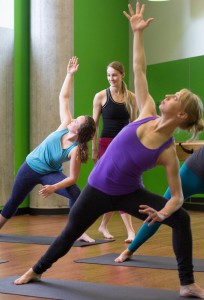How much is enough?
 Research clearly shows that exercise helps preserve physical and mental functioning, and helps to slow the progression of PD. Furthermore, research indicates that, as long as you are capable of doing it, more is better. There doesn’t appear to be a level of exercise where the benefits drop off. The web site of the National Parkinson Foundation has a summary of the benefits of exercise, which offers the following:
Research clearly shows that exercise helps preserve physical and mental functioning, and helps to slow the progression of PD. Furthermore, research indicates that, as long as you are capable of doing it, more is better. There doesn’t appear to be a level of exercise where the benefits drop off. The web site of the National Parkinson Foundation has a summary of the benefits of exercise, which offers the following:
“…when it comes to exercise and PD, greater intensity equals greater benefits. Experts recommend that people with Parkinson’s, particularly young onset or those in the early stages, exercise with intensity for as long as possible as often as possible. Your doctor might recommend an hour a day three or four times a week, but most researchers think that the more you do, the more you benefit.”
People who know me are no doubt already beginning to see where this is going.
I don’t own a car, which means that I walk or bike pretty much everywhere. I am also very lucky to have a gym next door to where I live which offers group training classes including strength, endurance, yoga, barre and cycling. My current exercise program includes one to three hours of exercise each day, 6 days per week, from workout classes to yoga to tango dancing to bike riding.
Although my doctors all applaud this program, it feels like it’s too much. I’m reminded of a teacher who recommends not spending your energy past having 75% left in reserve – my program is certainly well beyond that. But I don’t want to give up any of it, in fact quite the opposite, when I exercise is when I feel the best, and I want to do more of all of it!
Thinking about this dilemma, it seems pretty common for me to want to do things that make me feel good, even when I know I am over-doing it. From drinking too much coffee to taking on too many projects, moderation has never come easy. The roots of this tendency are hard to see clearly. There is for sure an element of panic about death and the end of my individual consciousness, and about serious disability and the resulting blow to my ego caused by having to be dependent on others. But my driven nature has existed since long before the onset of Parkinson’s, and I honestly don’t know where it really comes from.
Thinking about the vow to “take refuge in the dharma,” I re-read Thich Nhat Hanh’s book The Heart of Understanding – Commentary on the Pranaparamita Heart Sutra. This short book seems to be all about correcting a fundamental wrong perception by pointing out that there is no such thing as a genuine separate self, that things cannot actually be created or destroyed, that there is no good without bad, or pure without impure. If this is true: if life and death are not the beginning and the end of anything except individual consciousness, and if individual consciousness isn’t that big a deal, then certainly it doesn’t make a lot of sense to be real driven, on behalf of my health or anything else.
Trying to apply these teachings this to my situation, I’ve scaled back my exercise program a bit, and am endeavoring to stay with the feelings this brings up. However, anyone who has any advice about how to be more moderate is welcome to comment!!
— Dale Bennett







